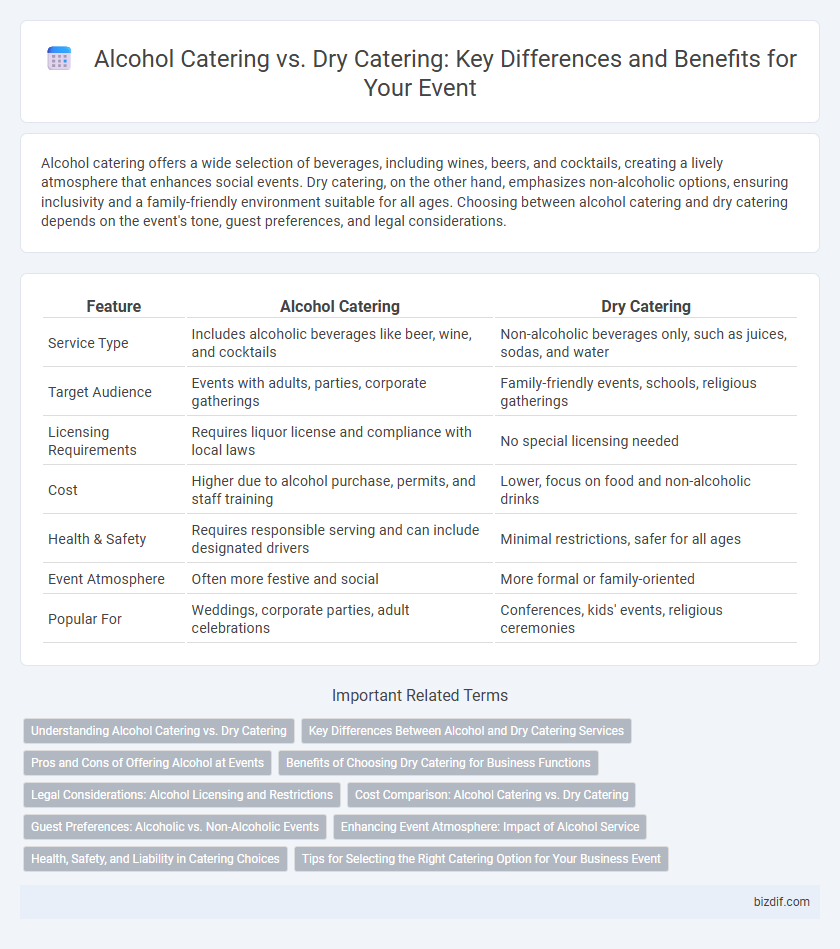Alcohol catering offers a wide selection of beverages, including wines, beers, and cocktails, creating a lively atmosphere that enhances social events. Dry catering, on the other hand, emphasizes non-alcoholic options, ensuring inclusivity and a family-friendly environment suitable for all ages. Choosing between alcohol catering and dry catering depends on the event's tone, guest preferences, and legal considerations.
Table of Comparison
| Feature | Alcohol Catering | Dry Catering |
|---|---|---|
| Service Type | Includes alcoholic beverages like beer, wine, and cocktails | Non-alcoholic beverages only, such as juices, sodas, and water |
| Target Audience | Events with adults, parties, corporate gatherings | Family-friendly events, schools, religious gatherings |
| Licensing Requirements | Requires liquor license and compliance with local laws | No special licensing needed |
| Cost | Higher due to alcohol purchase, permits, and staff training | Lower, focus on food and non-alcoholic drinks |
| Health & Safety | Requires responsible serving and can include designated drivers | Minimal restrictions, safer for all ages |
| Event Atmosphere | Often more festive and social | More formal or family-oriented |
| Popular For | Weddings, corporate parties, adult celebrations | Conferences, kids' events, religious ceremonies |
Understanding Alcohol Catering vs. Dry Catering
Alcohol catering involves providing a selection of alcoholic beverages, including wine, beer, and spirits, tailored to enhance social events and celebrations. Dry catering, on the other hand, excludes alcoholic drinks, focusing solely on non-alcoholic options such as juices, sodas, and mocktails, often preferred for family-friendly or corporate events with alcohol restrictions. Choosing between alcohol catering and dry catering depends on event type, guest preferences, budget considerations, and legal requirements surrounding alcohol service.
Key Differences Between Alcohol and Dry Catering Services
Alcohol catering services provide a variety of alcoholic beverages including beer, wine, and spirits, often requiring special licenses and adherence to legal regulations, while dry catering focuses exclusively on non-alcoholic options such as juices, sodas, and mocktails. Alcohol catering typically involves trained bartenders and offers customized drink menus tailored to the event type, enhancing guest experience through sophisticated beverage selections. Dry catering prioritizes inclusivity and safety, making it ideal for family-friendly events, religious gatherings, and venues with alcohol restrictions, emphasizing hydration and refreshment without the risks associated with alcohol consumption.
Pros and Cons of Offering Alcohol at Events
Offering alcohol at events enhances guest experience by encouraging social interaction and elevating the atmosphere, but it also introduces challenges such as increased liability risks and potential overconsumption. Alcohol catering demands strict compliance with legal regulations and often requires hiring licensed bartenders, which can increase event costs. Dry catering eliminates these concerns, promoting a safer, family-friendly environment, but may limit appeal for certain audiences seeking a more festive celebration.
Benefits of Choosing Dry Catering for Business Functions
Dry catering offers a professional and inclusive environment by eliminating alcohol-related distractions and potential liabilities, ensuring a safer setting for all attendees. It promotes a focus on networking and productivity, which is essential for successful business functions or corporate events. Choosing dry catering reduces insurance costs and compliance issues, making it a practical and cost-effective option for organizations aiming to maintain professionalism and inclusivity.
Legal Considerations: Alcohol Licensing and Restrictions
Alcohol catering requires strict adherence to legal considerations including obtaining appropriate alcohol licenses and abiding by local regulations governing alcohol distribution and consumption. Dry catering services avoid these licensing complexities but must still ensure compliance with event permits and food safety regulations. Failure to comply with alcohol licensing laws can result in heavy fines, event shutdowns, and legal liabilities.
Cost Comparison: Alcohol Catering vs. Dry Catering
Alcohol catering typically incurs higher costs due to expenses for beverages, licensing, and trained staff, while dry catering generally offers a more budget-friendly option by eliminating alcohol-related fees. The inclusion of alcoholic drinks can increase the overall catering bill by 30-50%, depending on the selection and quantity of beverages provided. Event planners must weigh these financial differences carefully to align catering choices with their budget and guest preferences.
Guest Preferences: Alcoholic vs. Non-Alcoholic Events
Guest preferences significantly influence the choice between alcohol catering and dry catering, with many opting for alcoholic events to enhance social interaction and celebration mood. Dry catering appeals to health-conscious attendees, designated drivers, and cultural or religious groups that abstain from alcohol, ensuring inclusivity and comfort. Understanding the demographic and event purpose allows caterers to tailor beverage offerings, balancing alcoholic and non-alcoholic options to optimize guest satisfaction.
Enhancing Event Atmosphere: Impact of Alcohol Service
Alcohol catering significantly enhances the event atmosphere by encouraging social interaction and creating a lively, festive environment that elevates guest enjoyment. Offering a variety of alcoholic beverages tailored to the event theme can increase attendee satisfaction and perceived value. In contrast, dry catering may limit the celebratory mood, focusing instead on inclusivity and responsible consumption without the influence of alcohol.
Health, Safety, and Liability in Catering Choices
Alcohol catering involves serving alcoholic beverages, which requires strict adherence to health regulations, age verification, and responsible service to prevent overconsumption and related liabilities. Dry catering, offering non-alcoholic options only, reduces risks of intoxication, accidents, and legal issues, enhancing safety for guests. Choosing between alcohol and dry catering significantly impacts liability insurance costs and event risk management strategies.
Tips for Selecting the Right Catering Option for Your Business Event
Evaluate your audience demographics and preferences to determine whether Alcohol Catering or Dry Catering suits your business event, as serving alcohol may enhance networking but could affect company policies. Consider legal regulations and licensing requirements in your event location to avoid compliance issues. Prioritize clear communication with your caterer to customize beverage options that align with your event's tone and brand image.
Alcohol Catering vs Dry Catering Infographic

 bizdif.com
bizdif.com